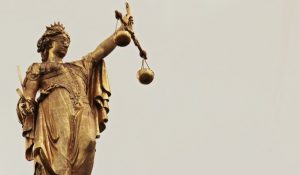Trial by Jury
 This article is inspired by, and largely attributed to, the late Nevada District Court Judge Patrick Flanagan. Judge Flanagan was a talented member of the local bar and an eminently respected jurist. He is admired and remembered for his keen legal mind, wit, and kind nature. It was his custom to present the history of the American justice system to prospective jurors prior to jury selection as a way of impressing upon them the importance of their role and to express to them his sincere appreciation for their service.
This article is inspired by, and largely attributed to, the late Nevada District Court Judge Patrick Flanagan. Judge Flanagan was a talented member of the local bar and an eminently respected jurist. He is admired and remembered for his keen legal mind, wit, and kind nature. It was his custom to present the history of the American justice system to prospective jurors prior to jury selection as a way of impressing upon them the importance of their role and to express to them his sincere appreciation for their service.
The principle of “trial by jury” is ingrained in our national identity. The right to be judged by a jury of our peers pervades our media and our national identity. It is foundational to our notions of justice and substantial fairness.
Before the concept of a trial by jury took hold, litigants were subject to the whims of a single individual’s sense of right and wrong. Whether a king, a magistrate appointed by the king, or a religious official, that person was charged with using their individual concept of justice to make decisions ranging from who owned what livestock, to whether a criminal accused would live or die. These decisions were traditionally subject to little or no review for accuracy, consistency, or personal bias. Trial by jury ensures that a civil or criminal defendant is accorded substantial justice when accused of wrongdoing, or when civil disputes arise.
Yet, despite its importance, few of us take the time to consider how the right to have our disputes settled by members of our own community became a cornerstone of the American justice system.
The jury system finds it roots in ancient Greece and the development of democratic principles. In the year 508 BC in Athens, a Greek Patrician by the name of Cleisthenes proposed a radical new form of government wherein the people – “demos” – would have the power – “kretos” – to form their own government, pass their own laws, and sit in judgment of their fellow citizens. At the time, juries consisted of 500 men over the age of thirty. Jury service was limited to men and lasted for six months.
The Roman Empire adopted the basic jury system in turn. To be entitled to a trial by jury, one was required to be a citizen of the Roman Empire. Juries typically consisted of 500 men, who could be subject to pressure and bribery. This is why modern jurors are protected by 21st century centurions – bailiffs – who protect the jury from outside influence.
Turning the page to approximately 1200 years in the future, at a small military garrison on the outskirts of the remnants of the Roman Empire along the banks of the River Thames, we reach Londinium. Distrustful of the royals’ taxation, English landlowners convinced Prince John, younger brother to King Richard Lionheart, to sign the Great Charter. There, we find for the first time the words trial by jury of our peers.
At that time, June 4th of 1215 A.D., jurors were drawn from the local community and used to tax property. Jurors were familiar with the land, and knew which orchards were bearing fruit, what fields were fallow, what forests were filled with game. This is where we get our tradition of drawing our citizens from the town, the county, the area in which the occurrence took place.
Four centuries later in 1689, following the English civil war, the English parliament issued their Bill of Rights. That Bill of Rights included many rights we now take for granted: The right to assemble peaceably; The right to petition parliament without interference by the monarch; The right to bear arms for defense; The right not to have soldiers quartered in your home; and, importantly, the right to trial by a jury of your peers.
Nearly a century later, Thomas Jefferson, James Madison, John Adams, and our other founding fathers considered the works of Greek and Roman philosophers, the writings of French academics, and the lessons of English history while constructing the framework of our Constitution. Although the United States of America was born in 1776, it was not until 1787 that the founding fathers brought these principles to their meeting in Philadelphia. It was then and there that they drafted the United States Constitution.
However, it would not be until 1789 that our founding fathers saw fit to amend our Constitution to add a Bill of Rights of our own to the U.S. Constitution. While the Sixth Amendment to that Bill of Rights applies to jury trials for criminal charges, we are privileged in this country to enjoy a right to jury trials in civil contexts as well.
If you are called to serve on a jury, pause to appreciate the privilege of your participation in a hallowed tradition of self-governance central to the American experience. If you require representation in a civil jury trial, the experienced attorneys at Lemons, Grundy & Eisenberg may be able to assist you.
